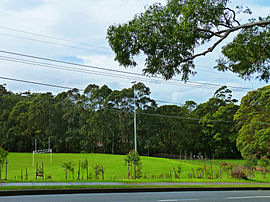West Pymble, New South Wales
|
West Pymble Sydney, New South Wales |
|||||||||||||||
|---|---|---|---|---|---|---|---|---|---|---|---|---|---|---|---|

Bicentennial Park, Yanko Road
|
|||||||||||||||
| Population | 5,151 (2011 census) | ||||||||||||||
| • Density | 1,438.8/km2 (3,727/sq mi) | ||||||||||||||
| Postcode(s) | 2073 | ||||||||||||||
| Area | 3.58 km2 (1.4 sq mi) | ||||||||||||||
| Location | 18 km (11 mi) north-west of Sydney CBD | ||||||||||||||
| LGA(s) | Ku-ring-gai Council | ||||||||||||||
|
|||||||||||||||
West Pymble is a suburb on the Upper North Shore of Sydney in the state of New South Wales, Australia 18 kilometres (11 mi) north-west of the Sydney Central Business District in the local government area of Ku-ring-gai Council. Pymble is a separate suburb to the east, sharing the postcode of 2073.
The land on which West Pymble was built was Guringai country, until European arrival brought disease which greatly reduced the population. By 1824, Aboriginal people in the area had been reduced to 'the remains of an Aboriginal tribe', who periodically walked through the area on their way from Bobbin Head to Pymble Hill. Early European settler Robert Pymble told his grandchildren that the Aboriginal people had gone by 1856.
Logging was the first industry of the area, with both government logging camps and private contractors felling the biggest trees and dragging them to the Lane Cove River or local sawpits. The Lofberg family, who were established in the area by the 1860s, shipped lumber to the Sydney markets on their boats, and raised nine children on their farm in West Pymble.
The rugged country and sloping land of West Pymble was slower to be settled than surrounding flatter areas, and became a bush haven for absconded convicts, illicit stills, gambling and cockfighting.
As the timber was felled, land was used for orchards, and by the 1880s growing citrus, apples, pears and stone fruit was a major industry. The Lofberg, Kendall and Munday families grew fruit and raised pigs on their mixed farms. These enterprises survived into the 1920s, although the arrival of codling moth decreased fruit growing, and the construction of the North Shore railway line in the 1890s made the land more valuable as residential property. Pymble soon boasted Hamilton Bros Universal Providers, near the station and other businesses. The Lofbergs diversified into quarrying, with their sandstone quarry being taken over by the Ku-ring-gai Council in 1926, to provide materials for roads and footpaths in the municipality.
...
Wikipedia
